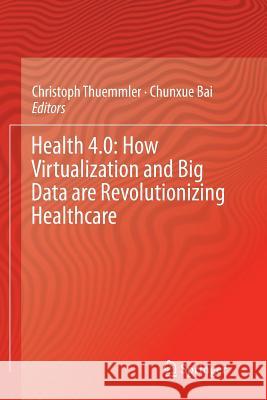Health 4.0: How Virtualization and Big Data Are Revolutionizing Healthcare » książka
topmenu
Health 4.0: How Virtualization and Big Data Are Revolutionizing Healthcare
ISBN-13: 9783319837826 / Angielski / Miękka / 2018 / 254 str.
Kategorie:
Kategorie BISAC:
Wydawca:
Springer
Język:
Angielski
ISBN-13:
9783319837826
Rok wydania:
2018
Wydanie:
Softcover Repri
Ilość stron:
254
Waga:
0.38 kg
Wymiary:
23.39 x 15.6 x 1.42
Oprawa:
Miękka
Wolumenów:
01
Dodatkowe informacje:
Wydanie ilustrowane











